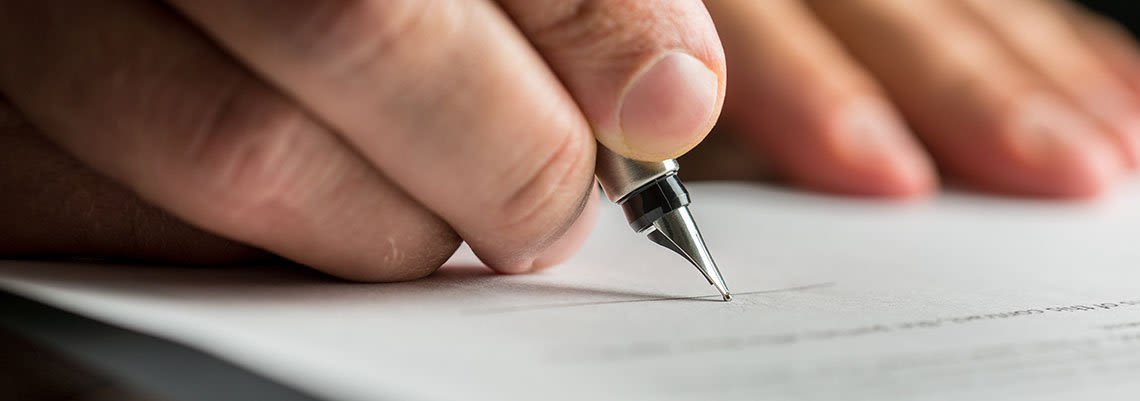
WHAT DO I DO IF I
THINK A WILL IS FORGED?
Perhaps the signature looks off, things have been crossed out without authentication, or a page seems to be missing. Or maybe the content of the will simply does not match what you knew about your loved one and their wishes. Could their will be forged?
The fact is that very few wills are formally contested, but that does not mean there are not forgeries submitted to the probate court when people die. Contesting the will is your right and your obligation if you believe it has been tampered with or forged. Texas law provides the opportunity to do just that.
For more than 30 years, I have helped clients in Corpus Christi, South Texas, and The Coastal Bend area to not only create valid wills but to help those with an interest contest wills that appear to be forged or invalid.
IF YOU SUSPECT A WILL IS FORGED
When wills are filed with the probate court, they become public documents and as such, are subject to public scrutiny. If you suspect a will is forged, you can contest its authenticity in court. There are four key reasons a will can be contested in Texas:
Improper execution: A written will must be signed by two or more credible witnesses. If it is an oral will, it must be witnessed by at least three individuals. Texas law also allows holographic wills, which must be entirely written by the decedent’s hand but require no witnesses.
Lack of testamentary capacity: Anyone who creates a will must be of “sound mind.” They must have known what they were doing, who their close family members were, understood what assets their estate had, and were capable of making decisions regarding the distribution of their estate.
Undue influence: There may be evidence that someone exerted influence over the decedent in the creation of their will. This could be a family member, friend, caregiver, or even an unethical attorney. Often, the person exerting undue influence is the primary beneficiary of the estate.
Fraudulent inducement: Like undue influence, this involves a person who misrepresents the content of the will to induce the testator to sign it without knowing what they are signing.
There is a time limit when contesting a will. In Texas, you have two years from the date the will is submitted to probate to contest it. If you see the will prior to submission and suspect it has been tampered with, you can contest it even before it has been submitted.
WHO CAN CHALLENGE A WILL’S VALIDITY?
The validity of a will can be contested by anyone who has an interest in the decedent’s estate. It could be a spouse or another heir, an organization that believes it was a beneficiary or even a creditor entitled to a repayment of debt from the estate.
It is important that anyone who wishes to contest a will do so based on a belief that it has been forged and not as a reaction to the content of the will. Improper execution, lack of capacity, undue influence, or fraudulent inducement should be the basis for a contest rather than disgruntlement, being omitted, or not receiving the share to which you believe you are entitled.
IF THE COURT DETERMINES
THE WILL IS FORGED...
If a probate court determines that the will was indeed forged, one of two courses of action may be taken. First, if a previous version of the will exists — a valid one dated earlier than the invalid will — the court can rely upon its contents to distribute the estate.
Second, the court can proceed as if there were no will at all. In this case, the court would follow the laws of intestate succession in Texas, dividing assets of the estate between spouses, children, parents, siblings, or grandparents.
WORK WITH AN
EXPERIENCED PROBATE ATTORNEY
Proving that a will is invalid is just like proving the invalidity of any legal contract or document. There must be a preponderance of evidence that the will does not reflect the wishes of the testator.
If you want to challenge a will, you should retain an experienced Texas probate attorney to document evidence and present the challenge to the court. As rare as contested wills are, successfully contesting a will is even rarer. Why do it alone when you can consult a knowledgeable attorney?
At my firm, I work with clients contesting wills in Corpus Christi, South Texas, The Coastal Bend area, and the counties of Bee, Kleberg, Nueces, Live Oak, Jim Wells, Aransas, and Victoria. I rely on 30 years of estate planning experience to help set the record straight.
If you suspect forgery of the will of a loved one or someone who expressed to you wishes divergent from those in the will, we should talk. Contesting wills can be challenging and take time so call me — Russell Manning Attorney at Law — today.